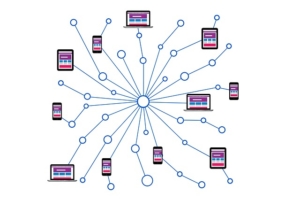How To Network Online as a Freelancer
Networking is an essential part of freelance life, both to keep yourself known that you’re looking for work, but also for meeting other freelancers to swap ideas, tips, potential work and even to have the occasional grumble with. Freelancing can be a lonely experience!
 Even if you’re based outside of a city (London, for example) where lots of networking events take place or don’t feel that you have time to network, it’s possible to do some very effective networking online – without leaving the comfort of your sofa.
Even if you’re based outside of a city (London, for example) where lots of networking events take place or don’t feel that you have time to network, it’s possible to do some very effective networking online – without leaving the comfort of your sofa.
Here’s some ideas to get you started on building your freelance network online.
Table of Contents
This has to be one of the simplest and quickest ways to get networking online as a freelancer. Go to Twitter.com and sign up with your desired username. Add a photo and a bit about yourself, then your away! For a basic beginners guide for how to tweet and get the most out of Twitter, Twitter’s official guide is a great place to start.
If you want to find people to follow who work specifically in your area, use a tool like Tweepz which allows you to search for keywords in people’s bios. Think ‘Designer’, ‘Consultant’, ‘Freelance’ or whatever keywords are associated with you industry.
Get started by following me at @benrmatthews and looking at who I follow on Twitter here.
Twitter Chats
Themed chats have become a popular event on Twitter recently. Taking place at a set time and date (with a timezone if location specific) and using a specific hashtag to ensure that all tweets around that subject are grouped together, Twitter Chats are a great way to meet other professionals and influencers in your industry.
For example, CommsChat is the home of Europe’s most popular communications conversation on Twitter. It looks at all aspects of comms including PR, marketing, reputation management, internal comms and all things digital. CommsChat broadcasts using the hashtag #CommsChat at 20:00 on Mondays (UK time). To get an idea of the kind of conversations that take place, transcripts of previous broadcasts are made available in their chat archive.
Search for a Twitter chat in your field and then take part next time it happens – it’s a great way to meet others in your line of work and been to connect with the wider industry. And if there isn’t a Twitter Chat in your area, why not start one yourself?
Twitter Lists
Another way to network on Twitter is to set up and share Twitter lists that are useful for the industry. For a guide on how lists work, check out this article in the Twitter help center. Lists are useful to keep track of who’s saying what in your industry and helps to make sure you’re following the right people.
As an added bonus, every time you add someone to the list, they’ll be alerted to the fact (if they’ve signed up to receive the notifications) and check your Twitter profile out in return. This means that the right people to know will be aware of who you are – always useful when you’re looking out for work or new clients.
 LinkedIn is the social network for professionals and if you haven’t got a LinkedIn profile setup, I’d recommend getting one set up straight away. You can connect with other freelancers and people working in your industry very easily – just send them a personal InMail saying why you’d like to connect (something along the lines of building your freelance network) and if they can give any advice on their freelance career. They will likely connect with you and may offer you some advice – or even work! – if you’re lucky.
LinkedIn is the social network for professionals and if you haven’t got a LinkedIn profile setup, I’d recommend getting one set up straight away. You can connect with other freelancers and people working in your industry very easily – just send them a personal InMail saying why you’d like to connect (something along the lines of building your freelance network) and if they can give any advice on their freelance career. They will likely connect with you and may offer you some advice – or even work! – if you’re lucky.
Once you’ve connected to a few other freelances in their area, take a look at how they market themselves. How do they describe their skills? What experience do they have and where? What else do they list in their profile? Use this to build your own profile and you’ll eventually have a fantastic LinkedIn page to use.
From there, take a look at the jobs section of LinkedIn. There may not be a lot of freelance work going, but you may be able to find a few opportunities or find out what skills are in demand in your industry.
You can connect with me on LinkedIn here.
LinkedIn Groups
The other activity you can do on LinkedIn to help build your network is to join LinkedIn Groups. These are essentially forums focussing on specialised areas, with every group member a professional working in that field.
So if you were a freelance comms consultant, you might search for PR, Marketing or Social Media groups. Once you’ve joined a few, make sure to introduce yourself and say why you’ve joined the group. Then take part in conversations being posted to the group. Lastly, connect with the other group members to grow your LinkedIn profile and build your network. You’ll also be alerted whenever someone posts a job to the group – so make sure you’re one of the first to reply if the right opportunity comes along.
L for small, specialist groups that do the work for you, rather than assuming all your work will come via networking events and referrals. Here’s a search onLinkedIn for freelancers to get you started on finding the right groups for you.
Blogging
 Writing a blog can be one of the best ways to promote yourself as a freelancer and build your network. It couldn’t be easier to get started – go to a blogging platform such as WordPress, Tumblr or Blogger and follow their sign up process. They are free to use and simple to get started, so this is the recommended route if you’re new to blogging.
Writing a blog can be one of the best ways to promote yourself as a freelancer and build your network. It couldn’t be easier to get started – go to a blogging platform such as WordPress, Tumblr or Blogger and follow their sign up process. They are free to use and simple to get started, so this is the recommended route if you’re new to blogging.
Once you have your blog set up, make sure you fill out an ‘About’ section, so that people can find out more about you, as well as the ‘Contact’ section, so people know ho to get in touch with you. You might also want to add links to your previous work as well as your other social networking profiles – Twitter and LinkedIn, at least.
Once set up, try to blog at least once a week on a topic in your line of work. It could be a post about what direction you think your industry is headed in, or the tools you use in your every day work and what other sites you would recommend other freelancers use. How about reviewing someone else’s work or campaign (be nice!) or writing a list of other blogs worth following in your area (take a look here for an example). If it helps, spend half an hour writing down every blog post idea that comes into your head. You should come up with at least 10 ideas, which will give you a few months worth of content.
And whenever you publish a blog, post it to your Twitter and LinkedIn profile so people can see that you’re blogging.
Guest Blogging
Writing for others people’s blogs or on magazine websites can be a quicker way of building your network than going to the effort of writing your own blog. They have an established readership that will likely be a lot larger than yours, plus they’ll have the associated social media profiles to help spread the word about articles.
To get started guest blogging, find the most read sites and blogs in your area. Read through their articles, looking for any guest writers that have been published recently. Get a feel for what kind of subjects they write on and try to come up with some ideas that you can approach them with. Send their editor an email explaining a few ideas and offering to guest blog for them (or use the contact form on a blog). You might not get a reply from everyone you contact, but you’ll likely get some responses to work on.
Agree on a subject, word count and deadline – and make sure you meet all three! Ask if you could get a link back to your own site and if they could mention your Twitter username when promoting the blog post. If you do well, you may be able to guest blog again, or you’ll be able to approach a bigger site with an example of the kind of writing you can do.
Freelance Forums
Forums are an oft-overlooked goldmine of information relating to all areas of freelance life, from setting up to finances to keeping clients satisfied. Start off by looking for forums in your industry, sign up and begin to read and comment on more established members posts. It can also help if you have any questions to ask them in forums – you’re more likely to get a response here. But make sure you take a good look through the forums first – your questions may well have been answered elsewhere already. Take a look at the forums on Freelance Switch and Freelance Folder to get started.
—
That’s my tips on how to network online as a freelancer. How do you build your freelance network? Feel free to share your advice in the comments.
About the Author

Ben Matthews blogs about freelancing at How To Go Freelance and is a director at Montfort, a digital marketing agency.
Join me on benrmatthews.com



